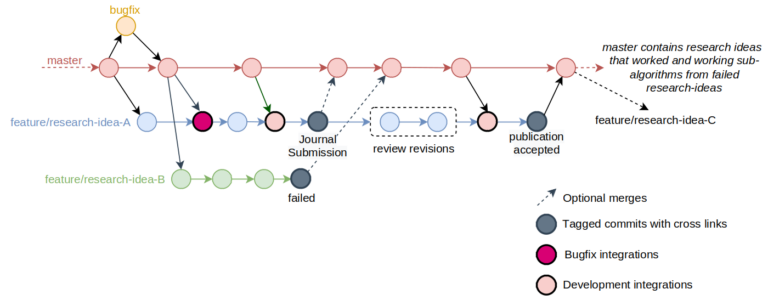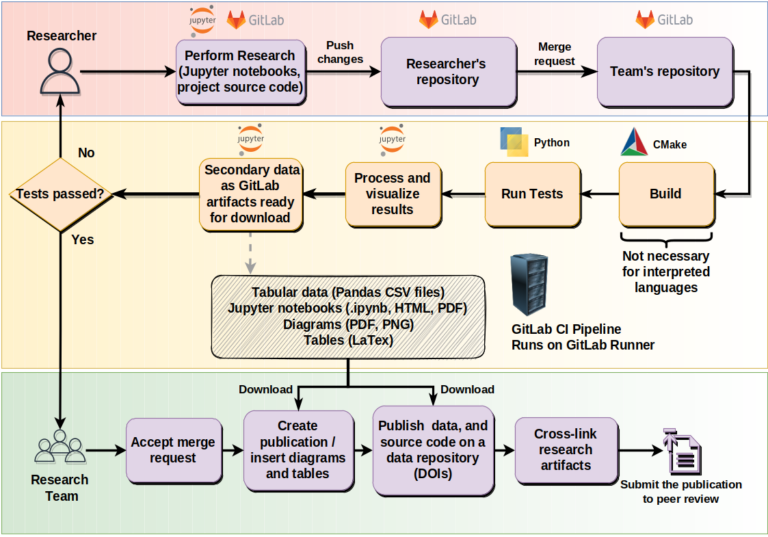Link to the service
Logo
Detailed description of the service
Are you an engineer in a project to (re-)program scientific code? Or are you a student in a likewise project? Or maybe you are a project/data manager looking for some inspiration and advice? Then this Knowledge Base might be just for you!
Modern research is based on software, from discoveries by simulations, computed on the worlds biggest supercomputers, to “simple” postprocessing scripts for evaluating experimental results. The Knowledge Base provides help on a variety of questions, that arise, when working with or on research software. It is easy to understand and comes with examples. Topics covered include Version Control, Automatic Testing and Continuous Integration, Publishing and DataSets.
Special about the Knowledge Base is the bride variety of topics, combined with tips and knowledge from people working on actual projects and code in academia. If you are a researcher, this is why you should have a look at the Knowledge Base.
Small teams in academia also are our typical use case. The workflow and methods proposed are adapted for such users. Even a single researcher will find a lot of inspiration in the materials.
The workflow and methods, while well suited for these academic settings, are not optimally designed for larger organizations with diverse specialized teams and software experts. Some topics relevant to many use cases in industry, like security and privacy, play only a minor role in writing e.g. numerical code, and are therefore not addressed.
The Knowledge Base can be found here.
Marić, Tomislav, Dennis Gläser, Jan-Patrick Lehr, Ioannis Papagiannidis, Benjamin Lambie, Christian Bischof, and Dieter Bothe. “A Research Software Engineering Workflow for Computational Science and Engineering.” arXiv, August 15, 2022. https://doi.org/10.48550/arXiv.2208.07460.
Terms of use & restrictions
All humans may use the service by accessing the webpage. It is to help/inform them.
There are no explicit costs to the users.
Contact
Moritz Schwarzmeier, schwarzmeier@mma.tu-darmstadt.de
Tomislav Maric, maric@mma.tu-darmstadt.de
References
publications that reference (or report on using) the service
A Research Software Engineering Workflow for OpenFOAM in Research Groups. Vol. 18. 18th OpenFOAM Workshop, 2023. https://youtu.be/CnwU5iDCzVI.
Linxweiler, Jan, Dennis Gläser, Moritz Schwarzmeier, Sven Marcus, and Sören Peters. “NFDI4Ing Community Meeting – FAIRe Softwareentwicklung in Der Wissenschaft,” March 15, 2023. https://doi.org/10.5281/ZENODO.7737630.
Linxweiler, Jan, Dennis Gläser, Moritz Schwarzmeier, and Sören Peters. “HeFDI Code School: Sustainable Research Software – Continuous Integration and Test Driven Development,” July 6, 2023. https://doi.org/10.5281/ZENODO.8119398.
Marić, Tomislav, Dennis Gläser, Jan-Patrick Lehr, Ioannis Papagiannidis, Benjamin Lambie, Christian Bischof, and Dieter Bothe. “A Pragmatic Workflow for Research Software Engineering in Computational Science,” 2023. https://doi.org/10.48550/ARXIV.2310.00960.
“A Research Software Engineering Workflow for Computational Science and Engineering.” arXiv, August 15, 2022. https://doi.org/10.48550/arXiv.2208.07460.
Schwarzmeier, Moritz. “OpenFOAM RSE-SIG: The SFB1194 Approach to CI with OpenFOAM or How to Make Research Software FAIR: CI for Extensions of the OpenFOAM Framework by Engineers,” December 7, 2023. https://doi.org/10.5281/ZENODO.10285141.
Schwarzmeier, Moritz, Dieter Bothe, and Tomislav Marić. “Applied CI: An Academic OpenFOAM Example: Engineering Research Software – NFDI4Ing Community Meets Archetype BETTY 2024,” February 27, 2024. https://doi.org/10.5281/ZENODO.10704898.
Schwarzmeier, Moritz, Jan-Patrick Lehr, and Christian Bischof. “Bringing Together Open Source Scientific Software Development for HPC and Beginners.” Presented at the FOSDEM 2022, Virtual, Online, May 2, 2022. https://archive.fosdem.org/2022/schedule/event/hpc_knowledge_base/.
Schwarzmeier, Moritz, Tomislac Marić, Tobias Tolle, Dennis Gläser, Jan-Patrick Lehr, Ioannis Pappagianidis, Benjamin Lambie, Dieter Bothe, and Christian Bischof. “A Research Software Engineering Workflow for Computational Science and Engineering.” online, November 30, 2022. https://doi.org/10.5281/zenodo.7331425.
Schwarzmeier, Moritz, Marić, Tomislac, Tolle, Tobias, Gläser, Dennis, Lehr, Jan-Patrick, Pappagianidis, Ioannis, Lambie, Benjamin, Bothe, Dieter, and Bischof, Christian. “A Research Software Engineering Workflow for Computational Science and Engineering,” February 20, 2023. https://doi.org/10.5281/ZENODO.7649162.
Schwarzmeier, Moritz, Tomislav Marić, Tobias Tolle, Dennis Gläser, Jan-Patrick Lehr, Ioannis Pappagianidis, Benjamin Lambie, Dieter Bothe, and Christian Bischof. “A Research Software Engineering Workflow for Computational Science and Engineering.” Presented at the NFDI4Ing Conference 2022, October 27, 2022. https://zenodo.org/record/7215818.
“A Research Software Engineering Workflow for Computational Science and Engineering,” June 26, 2023. https://doi.org/10.5281/ZENODO.7930299.
“A Research Software Engineering Workflow for OpenFOAM in University Research Groups,” July 14, 2023. https://doi.org/10.5281/ZENODO.8146336.
“‘Continuous’ Integration of Scientific Software (in Computational Science and Engineering).” Braunschweig, Germany, October 13, 2022. https://doi.org/10.5281/zenodo.7153143.
“‘Continuous’ Integration of Scientific Software (in Computational Science and Engineering) – The Research Software Engineering Workflow Presented in the Knowledge Base.” September 29, 2022. https://doi.org/10.5281/zenodo.7119067.
“FAIR Research Software Development: A Research Software Engineering Workflow,” September 11, 2023. https://doi.org/10.5281/ZENODO.8333451.
Schwarzmeier, Moritz, Maric, Tomislav, Tolle, Tobias, Lehr, Jan-Patrick, Pappagianidis, Ioannis, Lambie, Benjamin, Bothe, Dieter, and Bischof, Christian. “Hands-on to a Research Software Engineering Workflow for Computational Science and Engineering – A Minimal Working Example.” Presented at the CleanCircles Datathon, Darmstadt, February 8, 2023. https://doi.org/10.5281/ZENODO.7669314.
Schwarzmeier, Moritz, Marić Tomislav, and Bothe Dieter. “Clean Circles | Forschungsdatenmanagement – A Research Software Engineering Workflow for Computational Science and Engineering.” Poster presented at the Winter School 2022: Sustainable and Resilient Energy for Europe?!, Darmstadt, December 6, 2022. https://doi.org/10.5281/zenodo.741383.
#WhyNFDI
Modern research is based on software, from discoveries by simulations, computed on the worlds biggest supercomputers, to “simple” postprocessing scripts for evaluating experimental results. The Knowledge Base provides help on a variety of questions, that arise, when working with or on research software. It is easy to understand and comes with examples. Topics covered include Version Control, Automatic Testing and COntinuous Integration, Publishing and DataSets.
Special about the Knowledge Base is the bride variety of topics, combined with tips and knowledge from people working on actual projects and code in academia. If you are a researcher, this is why you should have a look at the Knowledge Base.
The Knowledge Base can be found here.
Miscellaneous


